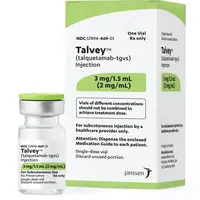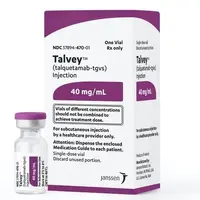Generic name: talquetamab-tgvs
Dosage form: injection, for subcutaneous use
Availability: Prescription only
Pregnancy & Lactation: Risk data not available
Brand names: Talquetamab (systemic) (monograph), Talquetamab
What is Talvey?
Talvey (talquetamab-tgvs) injection is a prescription medicine used to treat adults with multiple myeloma.
Talvey is used in patients who have already received at least 4 different treatment regimens, including a proteasome inhibitor, an immunomodulatory agent and an anti-CD38 monoclonal antibody to treat their multiple myeloma, AND their cancer has come back or did not respond to prior treatments.
Talvey belongs to a class of medicines called T-cell engagers. T-cell engagers are antibodies that direct the immune system's T cells to fight cancer cells.
Warnings
Talvey is available only through the Tecvayli and Talvey Risk Evaluation and Mitigation Strategy (REMS) due to the risk of CRS and neurologic problems.
You will receive a Patient Wallet Card from your healthcare provider. Carry the Patient Wallet Card with you at all times and show it to all of your healthcare providers. The Patient Wallet Card lists signs and symptoms of CRS and neurologic problems.
Get medical help right away if you develop any of the signs and symptoms listed on the Patient Wallet Card. You may need to be treated in a hospital. If you have any questions about Talvey, ask your healthcare provider. Your healthcare provider may temporarily stop or completely stop your treatment if you develop CRS, neurologic problems or any other side effects that are severe.
Talvey may cause side effects that are serious, life-threatening, or lead to death, including Cytokine Release Syndrome (CRS) and neurologic problems.
Call your healthcare provider or get medical help right away if you develop any of the signs or symptoms of CRS or neurologic problems listed below at any time during your treatment with this medicine:
Cytokine Release Syndrome (CRS)
CRS is common during treatment with this medicine and can also be serious or life-threatening. Signs and symptoms of CRS may include:
- fever (100.4°F or higher)
- dizziness or lightheadedness
- chills
- difficulty breathing
- feeling anxious
- headache
- fast heartbeat
Neurologic problems
Symptoms of neurologic problems with Talvey may include:
- headache
- feeling confused
- being less alert or aware
- feeling disoriented
- trouble speaking or writing
- shaking (tremors)
- numbness and tingling (feeling like “pins and needles”)
- feeling sleepy
- feeling very sleepy with low energy
- slow or difficulty thinking
- seizures
- muscle weakness
- memory loss
- burning, throbbing, or stabbing pain
Due to the risk of CRS and neurologic problems, you should be hospitalized for 48 hours after all doses of Talvey that are part of the “step-up dosing schedule”. The “step-up dosing schedule” is when you receive the first 2 or 3 doses, which are smaller “step-up” doses, and also the first full “treatment dose”.
How should I take Talvey
- Talvey will be given to you by your healthcare provider as an injection under your skin (subcutaneous injection), usually in the stomach area (abdomen). Talvey may also be injected into your thigh or another area of your body.
- If you miss any appointments, call your healthcare provider as soon as possible to reschedule your appointment.
Precautions
Do not drive, operate heavy machinery, or do other dangerous activities during and for 48 hours after your Talvey “step-up dose” is completed or at any time during treatment with Talvey, if you develop dizziness, confusion, tremors, sleepiness, or any other symptoms that impair consciousness until your signs and symptoms go away. These may be signs and symptoms of CRS or neurologic problems.
Dosing information
Talvey is given weekly or every 2 weeks. Your healthcare provider will decide the number of days to wait between your doses of Talvey as well as how many treatments you will receive.
- If you receive your dose, “Step-up dose 1” is given on day 1 of treatment. “Step-up dose 2” is usually given on day 4 of treatment. The first “treatment dose” is usually given on day 7 of treatment.
- If you receive your dose every 2 weeks, “Step-up dose 1” is given on day 1 of treatment. “Step-up dose 2” is usually given on day 4 of treatment. “Step-up dose 3” is usually given on day 7 of treatment. The first “treatment dose” is usually given on day 10 of treatment.
If your dose is delayed for any reason, you may need to repeat the “step-up dosing schedule” to receive Talvey. Before each “step up” dose, you will receive medicines to help reduce your risk of CRS. Your healthcare provider will decide if you need to receive medicines to help reduce your risk of CRS with future doses. Your healthcare provider will monitor you for signs and symptoms of CRS, neurologic problems, as well as other side effects and treat you as needed.
Before Taking
Before you receive Talvey, tell your healthcare provider about all of your medical conditions, including if you:
- have an infection
- are pregnant or plan to become pregnant. Talquetamab-tgvs may harm your unborn baby. Tell your healthcare provider if you become pregnant or think that you may be pregnant during treatment with Talvey.
Females and Pregnancy
Females who are able to become pregnant:
- Your healthcare provider should do a pregnancy test before you start treatment with Talvey.
- You should use effective birth control (contraception) during treatment and for 3 months after your last dose of Talvey.
are breastfeeding or plan to breastfeed. It is not known if Talvey passes into your breast milk. Do not breastfeed during treatment and for 3 months after your last dose of Talvey.
Tell your healthcare provider about all the medicines you take, including prescription and over-the-counter medicines, vitamins, and herbal supplements.
Talvey side effects
Talvey may cause serious side effects, including:
- Mouth problems and weight loss. Symptoms include: changes in sense of taste, dry mouth, trouble swallowing, and mouth sores
- Infections: Symptoms include, fever of 100.4°F (38°C) or higher, chills, cough, chest pain, tiredness, shortness of breath, painful rash, sore throat, pain during urination, feeling weak or generally unwell
- Decreased blood cell counts
- Skin problems: Symptoms such as skin rash, raised red bumps, or skin redness.
- Liver problems: Symptoms include: tiredness, loss of appetite, pain in your right upper stomach-area (abdomen), dark urine, yellowing of your skin or the white part of your eyes
Common Talvey Side Effects
The most common side effects of Talvey include:
- changes in your sense of taste
- nail problems
- muscle and joint pain
- feeling very tired
- weight loss
- dry mouth
- fever
- very dry skin affecting the mucous membranes
- difficulty swallowing
- infected nose, sinuses or throat (cold)
- diarrhea
The most common severe abnormal lab test results with this medicine include: decreased white blood cells and red blood cells.
These are not all the possible side effects of Talvey.
Call your doctor for medical advice about side effects. You may report side effects to FDA at 1-800-FDA-1088.
Related/similar drugs
Darzalex, Blenrep, Tecvayli, Carvykti, Revlimid, Velcade, PomalystImportant information
Talvey is available only through the Tecvayli and Talvey Risk Evaluation and Mitigation Strategy (REMS) due to the risk of CRS and neurologic problems.
You will receive a Patient Wallet Card from your healthcare provider. Carry the Patient Wallet Card with you at all times and show it to all of your healthcare providers. The Patient Wallet Card lists signs and symptoms of CRS and neurologic problems.
Get medical help right away if you develop any of the signs and symptoms listed on the Patient Wallet Card. You may need to be treated in a hospital. If you have any questions about Talvey, ask your healthcare provider. Your healthcare provider may temporarily stop or completely stop your treatment if you develop CRS, neurologic problems or any other side effects that are severe.
Talvey may cause side effects that are serious, life-threatening, or lead to death, including Cytokine Release Syndrome (CRS) and neurologic problems.
Call your healthcare provider or get medical help right away if you develop any of the signs or symptoms of CRS or neurologic problems listed below at any time during your treatment with this medicine:
Cytokine Release Syndrome (CRS)
CRS is common during treatment with this medicine and can also be serious or life-threatening. Signs and symptoms of CRS may include:
- fever (100.4°F or higher)
- dizziness or lightheadedness
- chills
- difficulty breathing
- feeling anxious
- headache
- fast heartbeat
Neurologic problems
Symptoms of neurologic problems with Talvey may include:
- headache
- feeling confused
- being less alert or aware
- feeling disoriented
- trouble speaking or writing
- shaking (tremors)
- numbness and tingling (feeling like “pins and needles”)
- feeling sleepy
- feeling very sleepy with low energy
- slow or difficulty thinking
- seizures
- muscle weakness
- memory loss
- burning, throbbing, or stabbing pain
Due to the risk of CRS and neurologic problems, you should be hospitalized for 48 hours after all doses of Talvey that are part of the “step-up dosing schedule”. The “step-up dosing schedule” is when you receive the first 2 or 3 doses, which are smaller “step-up” doses, and also the first full “treatment dose”.
Talvey Dosing Information
Talvey is given weekly or every 2 weeks. Your healthcare provider will decide the number of days to wait between your doses of Talvey as well as how many treatments you will receive.
- If you receive your dose, “Step-up dose 1” is given on day 1 of treatment. “Step-up dose 2” is usually given on day 4 of treatment. The first “treatment dose” is usually given on day 7 of treatment.
- If you receive your dose every 2 weeks, “Step-up dose 1” is given on day 1 of treatment. “Step-up dose 2” is usually given on day 4 of treatment. “Step-up dose 3” is usually given on day 7 of treatment. The first “treatment dose” is usually given on day 10 of treatment.
If your dose is delayed for any reason, you may need to repeat the “step-up dosing schedule” to receive Talvey. Before each “step up” dose, you will receive medicines to help reduce your risk of CRS. Your healthcare provider will decide if you need to receive medicines to help reduce your risk of CRS with future doses. Your healthcare provider will monitor you for signs and symptoms of CRS, neurologic problems, as well as other side effects and treat you as needed.





